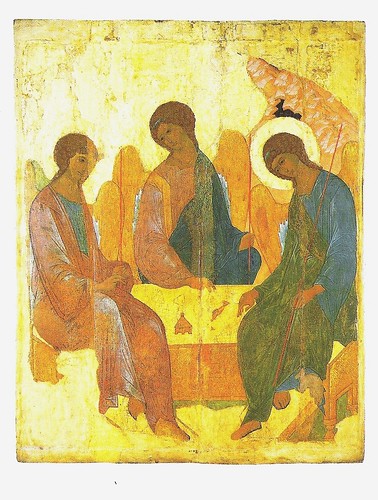
This icon by Andrei Rublev was painted in the fifteen century. It depicts the three angels who came to visit Abraham at the Oak of Mamre. But it is also taken to be a representation of the Trinity. All the figures wear blue robes, but the figure on the left is clad in a concealing robe, representing God the Father who is hidden from sight, that in the centre is also clad in brown with a gold strip, representing earthly things and kingship, whilst that on the right is also clad in green, which in the Orthodox tradition corresponds to the Holy Spirit.
This has a bearing on a discussion I had last week with a Dominican. We started by talking about ecumenism and that went on to the notorious "Filioque clause" which was supposedly the cause of the split between the Western Latin Rite Catholic Church and the Orthodox churches which owe their allegiance to Constantinople or Moscow. Who is right? Does it matter anyway?
I have always pictured the Trinity as a dynamic movement between the Three Persons - something like the formula for benzene which came to the nineteenth century scientist Kekulé when he sank into a trance-like state whilst staring into a fire. This is the triangular relationship implicit in the Filioque, rather than a linear relationship expressed in the Orthodox formulation of the doctrine.
Rublev, working in the Orthodox tradition, presents the relationship between the three Persons of the Trinity as dynamic. That is not what one would expect.
The fact that God is in the world and makes his presence manifest, above all in the Blessed Sacrament, tells us immediately that there are at least two divine Persons, and that implies automatically the existence of a third, the Holy Spirit. It cannot be otherwise.
Kommentarer